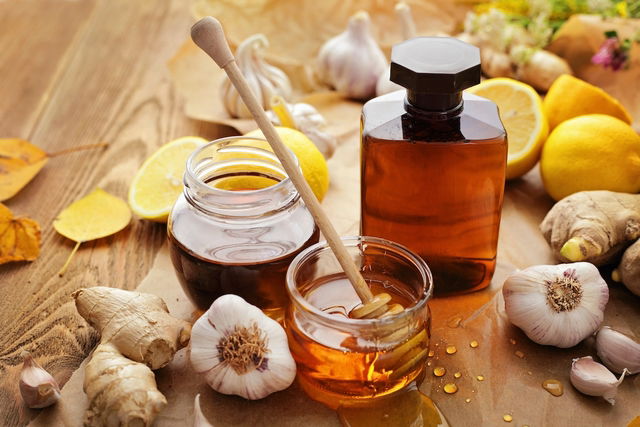Some natural expectorants, such as onion-garlic syrup, carrot syrup, or cinnamon-ginger syrup, contain substances that help thin mucus, making it easier to clear and relieve a cough.
A cough is the body’s defense mechanism designed to eliminate an irritating substance or agent from the throat or lungs, and is a common symptom of, for example, the flu, cold, sinusitis, bronchitis or respiratory allergies. Learn about the main causes of colds and coughs.
Natural expectorants can help clear mucus and relieve a cough, but they are not a substitute for medical evaluation and treatment by a pulmonologist or ENT doctor.

10 Natural Expectorants
Some natural expectorant options are:
1. Onion Garlic Syrup
Onion Garlic Syrup can help relieve colds because it is rich in sulfur compounds and allicin, which have expectorant and antiseptic properties, making it a good natural expectorant choice for relieving coughs caused by colds, flu, and bronchitis.
Among other things, this syrup boosts the immune system, reduces inflammation in the respiratory tract, and moisturizes the throat.
raw material:
- 1 medium striped onion;
- 1 crushed garlic clove;
- Honey.
Preparation:
Place the onion and garlic in a glass container and add enough honey to cover the onion and garlic. Combine ingredients and store in refrigerator overnight.
Children over 2 years old can be given 2.5ml of syrup, equivalent to 1/2 dessert scoop, up to 3 times a day. Adults can drink 5ml or 1 dessert spoon of syrup up to 3 times a day. Unused syrup should be discarded after 1 week.
As it contains honey, onion and garlic syrup, it should not be used by children under 2 years old, pregnant women with gestational diabetes or people with diabetes as they can increase blood sugar levels and impair blood sugar control.
2. Thyme Syrup
Thyme syrup is a great natural expectorant syrup option for throat and lung inflammation, bronchitis, flu and colds.
This is because thyme is rich in anti-inflammatory and antioxidant substances, such as thymol, carvacrol, cymene, and linalool, which have expectorant effects, can eliminate mucous membranes, and relieve cough.
raw material:
- 1 bunch dried or fresh thyme;
- 3 cups of water;
- ½ cup honey.
Preparation:
Place the thyme and water in a container and cook until the water evaporates and is reduced to one-third of the original amount. Turn off the heat and let it stand for about 3 minutes. Then, when the temperature is lukewarm, remove the thyme sprigs and add the honey.
Take a teaspoon of the syrup as needed and store it in a clean, dry glass jar in the refrigerator for up to 2 months.
For example, people with stomach problems such as gastritis or ulcers, those with liver disease, or those who are taking anticoagulant medications such as warfarin or clopidogrel should not use thyme syrup.
Also, since it contains honey, this syrup should not be used by people with allergies to honey, propolis, or pollen. In this case, 85 grams of sugar can be used instead of honey.
Another way to use thyme for bronchitis is in the form of a tea. Learn how to brew thyme tea.
3. Cinnamon Ginger Syrup
Ginger syrup is rich in cinnamaldehyde and gingerol, which have anti-inflammatory, analgesic, and expectorant properties, helping to relieve cough and reduce phlegm.
raw material:
- 1 cinnamon stick or 1 teaspoon ground cinnamon;
- 1 cup sliced ginger root, peeled;
- 85 grams of sugar;
- 100 ml of water.
Preparation:
Bring the water and sugar to a boil, stirring until the sugar is completely dissolved. Turn off the heat, add the ginger and cinnamon, and stir. Store the syrup in a clean, dry glass jar. Take 1 teaspoon of cinnamon-ginger syrup 3 times daily.
People who have bleeding problems or are taking anticoagulant medications should not use cinnamon ginger syrup, as it may increase the risk of bleeding and bruising.
Additionally, pregnant women who are near labor or who have a history of miscarriage, blood clotting problems, or risk of bleeding should avoid this syrup.
Ginger syrup is rich in cinnamaldehyde and gingerol, which have anti-inflammatory, analgesic, and expectorant properties, helping to relieve cough and reduce phlegm.
4. Watercress Pineapple Syrup
Watercress and pineapple syrup is an excellent natural expectorant because it contains bromelain and flavonoids, which have expectorant and decongestant properties that help release mucus and relieve coughs.
Plus, this syrup is rich in vitamins C and A, which help boost your immune system against things like bronchitis, sinusitis, and the flu.
raw material:
- 200 g radish;
- 1/3 a bunch of chopped watercress;
- 1/2 sliced pineapple;
- 2 chopped beets;
- 600 ml of water;
- 1/2 cup honey.
Preparation:
Combine all ingredients except honey in a blender and simmer the mixture for 40 minutes. Let it cool down a bit, strain, add 1/2 cup of honey and stir well. Take 1 tablespoon 3 times daily. For children, the dosage should be 1 teaspoon 3 times daily.
This syrup should not be used by pregnant women or those with allergies to honey, propolis or pollen.
5. Beet Syrup with Honey
Beet syrup with honey has respiratory anti-inflammatory properties and is a good natural expectorant choice for relieving a cough from a cold or flu. Additionally, honey helps lubricate the throat, reduces inflammation, and relieves coughs.
People who are allergic to honey, propolis or pollen should not use this syrup.
raw material:
- 1 raw beetroot;
- 2 tbsp honey.
Preparation:
Wash and thinly slice the beets and place in a clean, dry glass container. Add honey, mix and let sit for 24 hours. Thereafter, the liquid portion that has formed (i.e. the syrup) is collected and transferred to another sterilized glass container and sealed well.
You can take 1 tablespoon of this syrup 3 times a day until symptoms disappear. Children over 1 year may take 1 teaspoon of beetroot syrup up to 3 times a day.
6. Carrot Syrup
Carrot syrup is a natural expectorant that helps relieve colds in the nose, throat and lungs, as it is rich in vitamins A and C and fusarium alcohol, which have expectorant and antioxidant properties.
Additionally, carrots help boost your immune system and fight colds or flu.
raw material:
- 1 grated carrot;
- 1/2 lemon;
- 2 tablespoons of sugar;
- 1 teaspoon of honey (for children over 2 years old only).
Preparation:
Grate or slice the carrots and place on a plate and cover with sugar. To enhance the healing effect, the juice of 1/2 lemon and 1 tablespoon of honey should be added to the whole carrot.
The dish should sit out in the open for a few minutes, when the carrots start to release their natural juices.
It is recommended to take 2 tablespoons of this syrup per day, but be careful as it contains a lot of sugar and is contraindicated for diabetics.
7. Licorice Syrup
Licorice syrup is rich in glycyrrhizin, which has expectorant and antitussive properties, which can help relieve coughs caused by colds or flu.
raw material:
- 1 teaspoon chopped dried or fresh licorice root;
- 2 tablespoons of honey;
- 1 cup of water.
Preparation:
In a pot, bring water and licorice root to a boil. When it starts to boil, cook on low heat for 5 minutes, turn off the heat and let it stand for 10 minutes. Then strain, wait to cool and add honey. Take 1 teaspoon of syrup up to 3 times daily.
Licorice syrup should not be taken by children, pregnant or breastfeeding women, or by people with heart disease, high blood pressure, kidney failure, liver or gallbladder disease.
8. Eldermint Syrup
Elderberry and Peppermint Syrup can help relieve a cold cough because it has anti-inflammatory properties and is a good natural expectorant choice for treating a cold or flu.
Additionally, this syrup has antibacterial and antiviral properties that help the body recover faster.
raw material:
- 1 teaspoon dried mint;
- 1 teaspoon dried elderflower;
- 500 ml of water;
- 250ml honey.
Preparation:
Place mint, elderberries, and water in a bowl and boil for 15 minutes. Then turn off the heat, strain and add honey until completely dissolved. You may take 1 teaspoon 3 times daily for cough and sore throat relief.
This syrup should be stored in glass jars in the refrigerator for up to three months. After this period, any unused amounts must be discarded.
Elderberry syrup should not be used by children, pregnant or breastfeeding women.
Additionally, elderberry stems, bark, and leaves should not be used to make syrup, as their ingredients contain lectins and cyanide, which may cause poisoning.
9. Mullein and Star Anise Syrup
Made from a tincture of mullein, star anise, thyme, plantain, licorice, and marshmallow, this syrup is anti-inflammatory and helps fight colds, relieve coughs, lubricate the throat, and reduce respiratory irritation.
raw material:
- 4 teaspoons mullein or mullein tincture;
- 1 tbsp star anise;
- 4 teaspoons marshmallow root tincture;
- 1 tablespoon thyme tincture;
- 4 teaspoons plantain tincture;
- 2 teaspoons licorice tincture;
- 100ml honey.
Preparation:
Combine all ingredients in a container, then add the syrup to a clean, dry glass jar with a lid. Take 1 teaspoon of syrup up to 3 times daily.
This syrup must be stored in the refrigerator and is good for 4 months. After this period, any unused amounts must be discarded.
Mullein, star anise, thyme, plantain, licorice, and marshmallow syrup should not be used by children, pregnant or nursing women, or those allergic to any of the ingredients.
In addition, the tincture contains alcohol in its composition, therefore, this syrup should not be used by people who are being treated for alcoholism and using the drug disulfiram.

